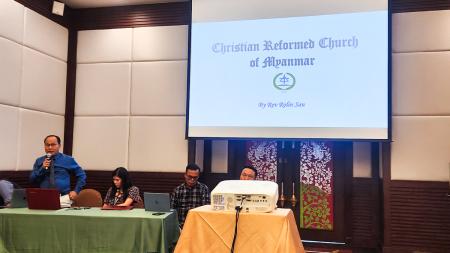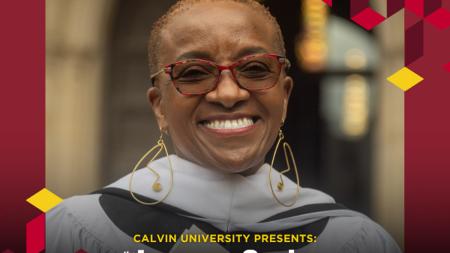New Book Looks at CRC's African American Family Members

The recent shooting of nine black people at a church in Charleston, S.C., shows that the evil of racism is still alive and well in the United States, says one of the authors of a new book published by the CRC’s Office of Race Relations.
And that shooting, at the historic Emanuel African Methodist Episcopal Church, where a white gunman opened fire on church members during a Bible study, was not an isolated incident in the U.S., said Michelle Loyd-Paige, executive associate to the president for diversity and inclusion at Calvin College.
"The momentum of history is still with us," said Loyd-Paige. "There may not be any separate drinking fountains today, and we don't need to sit at the back of the bus, but the issues and suspicions remain."
Loyd-Paige spoke about the incident in Charleston as part of an interview about the new book African Americans: We've Come This Far by Faith, which she co-wrote with Eric Washington, an associate professor of history at Calvin and director of the college's African and African Diaspora Studies program. The new book came out before the shooting in Charleston.
In the book, though, the authors write about recent deaths of black men at the hands of police officers in places such as Ferguson, Mo., where a black man was shot and killed, and Staten Island, N.Y., where another black man was choked to death.
The authors also discuss recent situations that went viral on social media, bringing to light the reality that racism is real even though the U.S. has twice elected a black president.
"There are racist chants by fraternity members at the University of Oklahoma, and a University of Maryland sorority celebrates one of its members' birthdays with a racist cake that objectifies black men," they write.
But the focus of the book is on more than instances of violence and racial prejudice.
Rather, its goal is to offer readers, especially in the Christian Reformed Church, a look at the full range of the black experience in the U.S., from various cultural celebrations to an overview of the unfolding history of black people in the U.S.
"With this book, we are fulfilling part of our mandate to have a better understanding of ethnic people who are part of the CRC family," said Esteban Lugo, director of the CRC's Office of Race Relations, which previously published a book on Hispanic Americans.
By having a better understanding, churches can move forward to discuss and address the many matters of race that they face in today’s world, he said.
"This book is really good and timely because of all the issues that are now bearing on the African American community," said Lugo. "It is important, especially at times like this, that we appreciate each other for who they are as part of God’s family."
Loyd-Paige says the book seeks to answer the question "Who are we?" and, in so doing, to bring about a deeper awareness of the issues and cultural circumstances that have shaped the life of black people in the U.S. today.
In the book, they write that African Americans come from many different countries and places and economic circumstances, have various family histories, possess a range of physical characteristics, and respond to life's challenges and circumstances in different ways.
"Black people are not all alike," they write. "We come in bodies decorated in shades of rich soil found across the face of the earth. Our skin is buff, sand, tan, tawny, copper, bronze, brown, caramel, coffee, mahogany, and burnt umber with undertones of of peaches and plums."
Among other things, the book sketches the story of slavery in the U.S., the Civil War era in which slaves were emancipated, and the many decades in which blacks experienced a separate but equal status.
It touches on the Great Migration of blacks from the South to work in the industrialized North and the fight for broader freedoms that culminated in the Civil Rights Act of 1964.
There is a chapter on commemorations and celebrations, short profiles of black leaders, and a section that looks at some of the effects of racism as they are played out in today’s society. The authors make the point that racism is woven into the fabric of the culture and has many devastating impacts on blacks.
"We can't deny the reality of injustice," said Loyd-Paige. "It is embedded in our various social systems."
For instance, they write, "The infant mortality rate of African Americans is twice that of white America; the poverty rate in 2013 for blacks was 27.3 percent, while nationally it was 14.5 percent."
They also point out that black unemployment is consistently twice that of whites and that "black men are more likely to be incarcerated and to receive more severe sentences than whites; and black students face harsher punishments in schools than do their white peers.”
The book also looks at what Scripture has to say about race, discusses what it means to be black and Reformed, and offers reflections on why it seems so difficult to talk about race.
"The truth is that it is hard work to talk honestly about race," said Loyd-Paige. "No one wants to be seen as a racist, and no one wants to be only seen as a victim.
"But we need to have honest conversations about race in order to live into the reconciliation of all things that God calls us to; reconciliation is kingdom work, and it is work that God wants us to do."
Loyd-Paige pointed out that after what happened in Charleston, there has been a rash of burnings of predominantly black churches in the South. Although no one has been arrested yet, authorities say that arson appears to be the cause of at least some of the fires.
But regardless of what authorities discover about the fires, said Loyd-Paige, it is more important than ever that people sit down and discuss the issue of race in the United States.
"We believe our book can help with that, with the whole goal of becoming God’s diverse and unified family," said Loyd-Paige.
"We hope the book can help people realize that understanding different cultures allows us to be more effective in carrying out and being involved in the mission of God."


